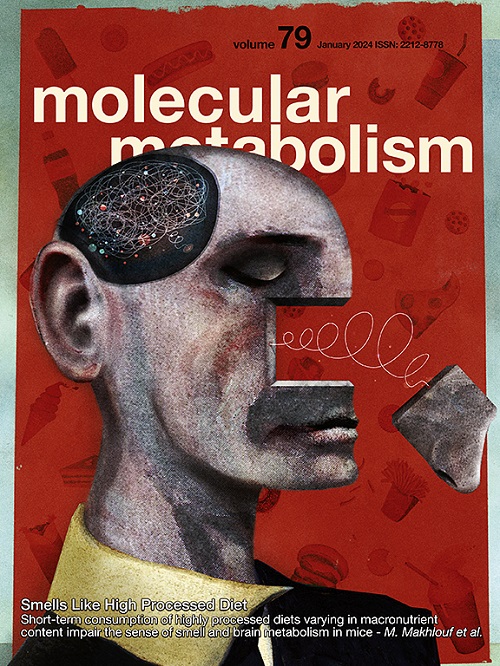The neglected PCK1/glucagon (inter)action in nutrient homeostasis beyond gluconeogenesis: Disease pathogenesis and treatment
IF 6.6
2区 医学
Q1 ENDOCRINOLOGY & METABOLISM
引用次数: 0
Abstract
Background
Glucagon plays a central role in hepatic adaptation during fasting, with the upregulation of hepatic phosphoenolpyruvate carboxykinase 1 (PCK1) traditionally associated with increased gluconeogenesis. However, recent experimental models and clinical studies have challenged this view, suggesting a more complex interplay between PCK1 and glucagon, which extends beyond gluconeogenesis and has broader implications for metabolic regulation in health and disease.
Scope of review
This review provides a comprehensive overview of the current evidence on the multifaceted roles of PCK1 in glucagon-dependent hepatic adaptation during fasting, which is crucial for maintaining systemic homeostasis not only of glucose, but also of lipids and amino acids. We explore the relationship between PCK1 deficiency and glucagon resistance in metabolic disorders, including inherited PCK1 deficiency and metabolic dysfunction-associated steatotic liver disease (MASLD), and compare findings from experimental animal models with whole-body or tissue-specific ablation of PCK1 or the glucagon receptor. We propose new research platforms to advance the therapeutic potential of targeting PCK1 in metabolic diseases.
Major conclusions
We propose that hepatic PCK1 deficiency might be an acquired metabolic disorder linking alterations in lipid metabolism with impaired glucagon signaling. Our findings highlight interesting links between glycerol, PCK1 deficiency, elevated plasma alanine levels and glucagon resistance. We conclude that the roles of PCK1 and glucagon in metabolic regulation are more complex than previously assumed. In this (un)expected scenario, hepatic PCK1 deficiency and glucagon resistance appear to exert limited control over glycemia, but have broader metabolic effects related to lipid and amino acid dysregulation. Given the shift in glucagon research from receptor inhibition to activation, we propose that a similar paradigm shift is needed in the study of hepatic PCK1. Understanding PCK1 expression and activity in the glucagon-dependent hepatic adaptation to fasting might provide new perspectives and therapeutic opportunities for metabolic diseases.
被忽视的PCK1/胰高血糖素(相互作用)在糖异生以外的营养稳态中的作用:疾病的发病机制和治疗。
背景:胰高血糖素在禁食期间的肝脏适应中起着核心作用,肝脏磷酸烯醇丙酮酸羧激酶1 (PCK1)的上调通常与糖异生增加有关。然而,最近的实验模型和临床研究挑战了这一观点,表明PCK1和胰高血糖素之间存在更复杂的相互作用,其范围超出了糖异生,并且对健康和疾病的代谢调节具有更广泛的影响。本文综述了目前关于PCK1在空腹胰高血糖素依赖性肝脏适应中的多方面作用的证据,这不仅对维持葡萄糖的系统稳态至关重要,而且对脂质和氨基酸也至关重要。我们探讨了代代性疾病(包括遗传性PCK1缺乏和代谢功能障碍相关的脂肪变性肝病(MASLD))中PCK1缺乏与胰高血糖素抵抗之间的关系,并比较了PCK1或胰高血糖素受体全身或组织特异性消融的实验动物模型的结果。我们提出了新的研究平台,以提高靶向PCK1在代谢性疾病中的治疗潜力。主要结论:我们提出肝脏PCK1缺乏可能是一种获得性代谢紊乱,与脂质代谢改变和胰高血糖素信号传导受损有关。我们的发现突出了甘油、PCK1缺乏、血浆丙氨酸水平升高和胰高血糖素抵抗之间的有趣联系。我们得出结论,PCK1和胰高血糖素在代谢调节中的作用比以前认为的要复杂得多。在这种(非)预期的情况下,肝脏PCK1缺乏和胰高血糖素抵抗似乎对血糖的控制有限,但具有与脂质和氨基酸失调相关的更广泛的代谢影响。鉴于胰高血糖素研究从受体抑制到激活的转变,我们建议在肝脏PCK1的研究中需要类似的范式转变。了解胰高血糖素依赖性肝脏对禁食的适应过程中PCK1的表达和活性可能为代谢性疾病提供新的视角和治疗机会。
本文章由计算机程序翻译,如有差异,请以英文原文为准。
求助全文
约1分钟内获得全文
求助全文
来源期刊

Molecular Metabolism
ENDOCRINOLOGY & METABOLISM-
CiteScore
14.50
自引率
2.50%
发文量
219
审稿时长
43 days
期刊介绍:
Molecular Metabolism is a leading journal dedicated to sharing groundbreaking discoveries in the field of energy homeostasis and the underlying factors of metabolic disorders. These disorders include obesity, diabetes, cardiovascular disease, and cancer. Our journal focuses on publishing research driven by hypotheses and conducted to the highest standards, aiming to provide a mechanistic understanding of energy homeostasis-related behavior, physiology, and dysfunction.
We promote interdisciplinary science, covering a broad range of approaches from molecules to humans throughout the lifespan. Our goal is to contribute to transformative research in metabolism, which has the potential to revolutionize the field. By enabling progress in the prognosis, prevention, and ultimately the cure of metabolic disorders and their long-term complications, our journal seeks to better the future of health and well-being.
 求助内容:
求助内容: 应助结果提醒方式:
应助结果提醒方式:


